Countering terrorism as adaptation to risks of the present: social essence and subjects of the process
The starting point of the article is the idea of the terrorist threat as one of the social risks of modernity, modifying a familiar environment and requiring adaptation. Proposed approach to counter-terrorism as a process of institutional and civil adaptation to the risky environment. The article presents the analysis of trends and dynamics of the process of adaptation to the risk of terrorism in Russia of the main subjects of counteraction: social institutions and civil society in 2005-2018. The substantial development of the Russian anti-terrorist legislation, the positive dynamics of the quality of the existing counteraction mechanism contribute to an active adaptation strategy and a high level of adaptation of institutional subjects to the risk of terrorism. At the same time, the reactive character of the Russian anti-terrorist legislation leads to insufficient implementation of the principles of priority measures to prevent terrorism and cooperation between the state and citizens in countering it. The low level of self-assessment of protection from terrorist attacks, the unwillingness of the population to participate in countering terrorism, distrust of institutional actors and the desire to shift all responsibility for the process of counteraction to them cause a passive adaptation strategy and a low level of adaptation of the Russian population to the risk of terrorism. The adaptive asymmetry in the speed and success of adaptation of institutional actors and the population hinders the process of countering terrorism as a whole. Scientific and practical measures aimed at restoring the balance of adaptation strategies and resource potentials of counter-terrorism subjects are proposed.
Figures
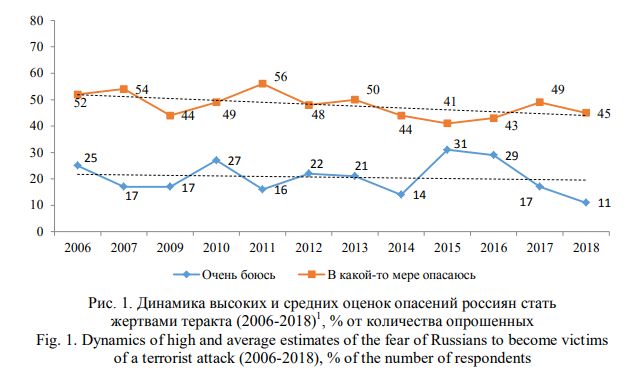

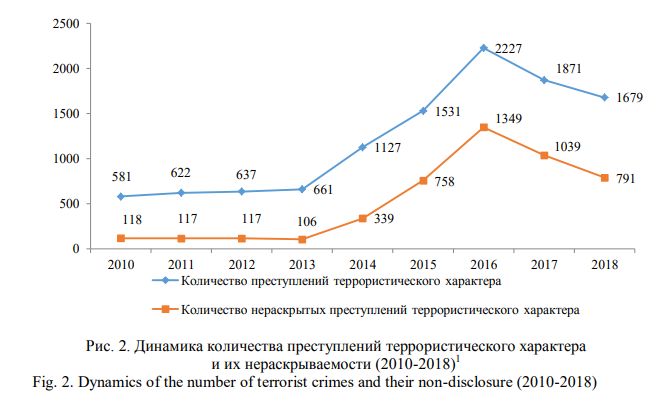
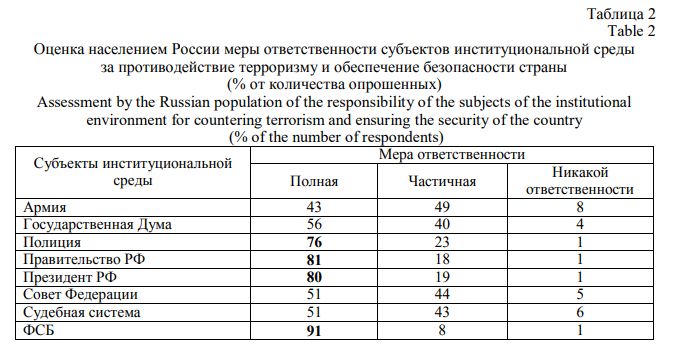
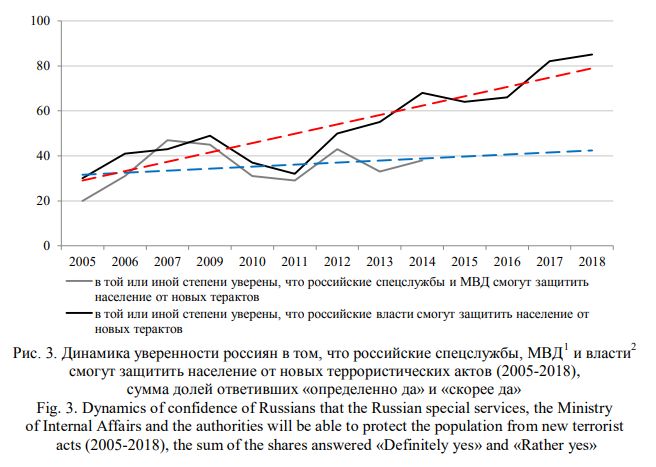

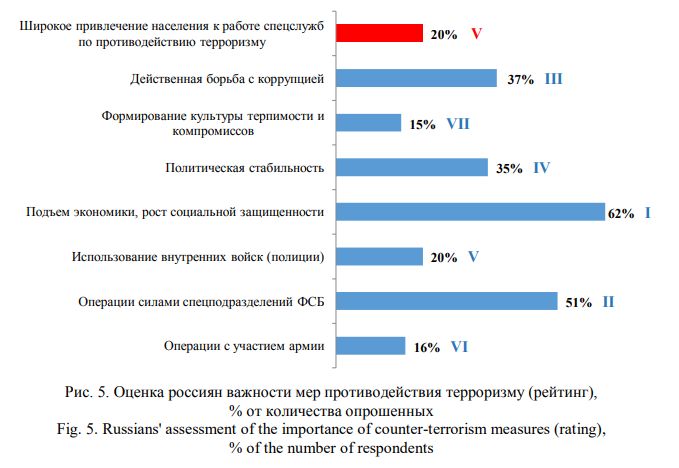
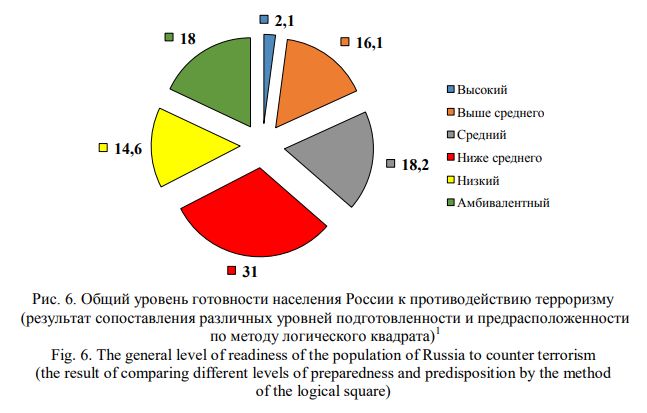


















While nobody left any comments to this publication.
You can be first.
Akkaeva, H. A. (2015), “New tendencies of legislation on extremism and terrorism in the Russian Federation”, Istoricheskie, filosofskie, politicheskie i yuridicheskie nauki, kul'turologiya i iskusstvovedenie. Voprosy teorii i praktiki, (10-2), 16-18. (In Russian).
Anishhenko, K. F. (2006), “Legal basis of counter-terrorism in Russia: a brief analysis of the Federal Law ‘On counter-terrorism’”, Teoriya i praktika obshhestvennogo razvitiya, (2), 87-92. (In Russian).
Butaev, M. Ya. (2015), “The use of detective activities' results in proving when investigating cases оf terrorist crimes”, Yuridicheskaya nauka i pravooxranitel'naya praktika, (3), 106-110. (In Russian).
Gryaznova, O. (2005), “Mass attitude to terrorism as an indicator of the political culture of the citizens of Russia”, Vestnik obshchestvennogo mneniya, (3), 16-29. (In Russian).
Kozyreva, P. M. (2004), The processes of adaptation and evolution of social well-being of Russians at the turn of XX-XXI centuries, Centr obshchechelovecheskih tsennostey, Moscow, Russia. (In Russian).
Kosarev, M. N. (2016), “The status and prospects of counter-terrorism in Russia: theoretical and practical aspects”, Vestnik Ural'skogo yuridicheskogo instituta MVD Rossii, (4), 37-41. (In Russian).
Kochoi, S. M. (2016), “The gaps in anti-terrorism legislation and proposals for bridging them”, Vserossijskij kriminologicheskij zhurnal, 10 (4), 740-749. (In Russian).
Markin, V. V. (2014), “Formation of Russian identity as a factor of counteraction to ideology of extremism and terrorism: regional aspect”, Vlast', 22 (6), 120-127. (In Russian).
Merkur'ev, V. V. and Agapov, P. V. (2016), “Issues of legal regulation of the plan of action of the head of a counter-terrorist operation”, Monitoring pravoprimeneniya, (2), 49-58. (In Russian).
Mozgovaya, A. V. and Shlykova, E. V. (2014), “Social resources and adaptation to risk: the choice of strategy (by the example the social community in the situation of particular risk)”, Sociologicheskaya nauka i social'naya praktika, (4), 25-49. (In Russian).
Pavlinov, A. V. (2014), “Legislative support of the fight against terrorism and other extremist activities: exhausted whether resources?”, Trudy Instituta gosudarstva i prava Rossijskoj akademii nauk, (3), 123-130. (In Russian).
Rogovaya, A. V. (2015), “Localization of counteraction to the ideology of extremism and terrorism in the municipality”, Vlast', (1), 124-130. (In Russian).
Russian Society and Challenges of The Time. Book Five (2017), in Gorshkov, M. K. and Petuhov, V. V. (eds.), Ves' Mir, Moscow, Russia. (In Russian).
Sembekova, B. R. (2018), “Terrorism – a threat to national security: the strategy of anti-criminal security of the person”, Society and Security Insights, 1 (4), 37-47. (In Russian).
Sobolev, V. A. (2010), «Countering terrorism in the ХХI century», Obozrevatel' – Оbserver, (8), 20-30. (In Russian).
Shalupenko, V. V. (2012), “The willingness of Russian citizens to countering terrorism”, Sociologicheskie issledovaniya, 12, 42-49. (In Russian).
Shlykova, E. V. (2018), “Subjective assessment of personal security as an indicator of adaptation to a risky environment”, Sociologicheskij zhurnal, 24 (3), 56-75. (In Russian).
Shheblanova, V. V. (2016), “Institutional forms of prevention of terrorist threats”, in Bronnikova, Yu. O., Myasnikova, L. V., Firsova, T. G. (eds.) Conflicts in the modern world: international, state and interpersonal dimension. Proceedings of the V International scientific conference, Pero, Moscow, Russia. (In Russian).
Shheblanova, V. V. (2012), “The social construction of the problems of terrorism”, Vestnik Nizhegorodskogo universiteta im. N.I. Lobachevskogo. Seriya: Social'nye nauki, (2), 103-107. (In Russian).
Shheblanova, V. V. (2013), “Тerrorist actions and their consequences regarding the concepts of social actions”, Vestnik SGTU, (1), 268-272. (In Russian).
Yax'yaev, M. Ya., Isaeva, E'. G. and Sutaeva, A. R. (2018), “Socio-psychological aspects of counteraction to terrorism in multicultural space”, Social'naya psixologiya i obshhestvo, 9 (2), 46-59. (InRussian).